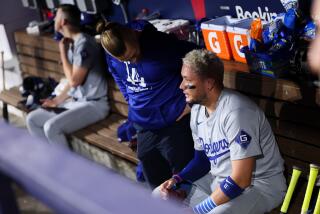Teen Finds Way to a National Stage : Boyle Heights Student Leads Team in National History Competition
- Share via
Fredy Rojas, a Boyle Heights high school student and aspiring actor, took a plane trip across his adopted country this week, from the barrio home where he lives with his mother, an unemployed garment worker, to Washington, D.C.
A lean and loquacious 18-year-old, Rojas attends Roosevelt High School. Three years ago, when he first arrived at Roosevelt from his native Mexico, he didn’t speak a word of English.
Now, Rojas is one of a team of seven Roosevelt students who have qualified for the finals of the National History Day competition, where students present class projects on events and personalities of the past.
Having qualified in a statewide tournament this spring in Sacramento, they are vying for the national prize against teams representing nearly all 50 states. Rojas is the lead actor in the team’s one-act play on Dr. Jonas Salk, who developed the polio vaccine and who is now conducting AIDS research.
On Wednesday, the team was staying at dormitories in the University of Maryland while awaiting the results of the competition. The event, which brings together more than 2,000 students, concludes today.
The Roosevelt project is no ordinary school play. Fraught with sensuality and clever symbolism, the play begins with seductive polio “viruses”--student-actresses Terry Najera and Claudia Reich--taunting the brooding immunologist as he attempts to find a cure for the virus that infected millions. Salk developed a vaccine in the early 1950s.
“Twenty-million killers on the head of pin,” Rojas intoned during a rehearsal last week. “Small, deadly, frightening . . . and elusive. The mystery of a killer too small to be seen.”
Rojas and three other students in the acting team wrote the script, making sure that the play was not only entertaining, but also scientifically and historically accurate.
Incorporating terms such as “immunological memory” into their script wasn’t easy, said Karen Moreno, 17, who plays the role of a nurse. “We researched a lot,” she said. “We rewrote a lot, edited, and took some parts out.”
Also going to Washington are three students--Brenda Galiano, 16, Mauricio Castillo, 18, and Irma Gurrola, 17--who prepared an audio-visual project on the history of the Associated Press, the news wire service.
Although Roosevelt students perennially score well below the state average in reading and math tests, the school’s History Day teams have fared well in local and statewide competitions. In the last five years, the Eastside school has sent several teams to the national finals, although they have never won the grand prize.
Instructor Mike Morrill said that win or lose, the experience of traveling to the nation’s capital is a good one for his students.
“Many of these students have been sheltered in the barrio,” said Morrill, a teacher at the high school for 27 years. “For some of them, it’s the first time they’ve ever gotten on a plane.”
Fredy Rojas made his first trip to Washington last year, when he played Leon Trotsky in a play about a romantic triangle involving the exiled revolutionary and Mexican artists Frida Kahlo and Diego Rivera.
The young immigrant confesses a passion for acting. He has also interpreted the role of Willy Loman’s drifter-son Biff in a school production of “Death of a Salesman.” One day, he said, he hopes to become a professional actor.
“I’m not good enough yet,” he said. “I watch TV, movies. . . . When I see somebody who is good, I get into it. And it makes me angry when I see an actor who isn’t giving his all.”
Rojas has a 3.24 grade-point average, one of the highest among students in the school’s English as a Second Language program. Although he has been accepted to Cal State Northridge, economic hardship may prevent Rojas from fulfilling his dreams.
“He’s always been very excited by school,” said his mother, Carmela Talamantes, 37, who struggles to support a family of five. “I’m sorry that we might not be able to give him more education. College is so expensive.”
More to Read
The biggest entertainment stories
Get our big stories about Hollywood, film, television, music, arts, culture and more right in your inbox as soon as they publish.
You may occasionally receive promotional content from the Los Angeles Times.











